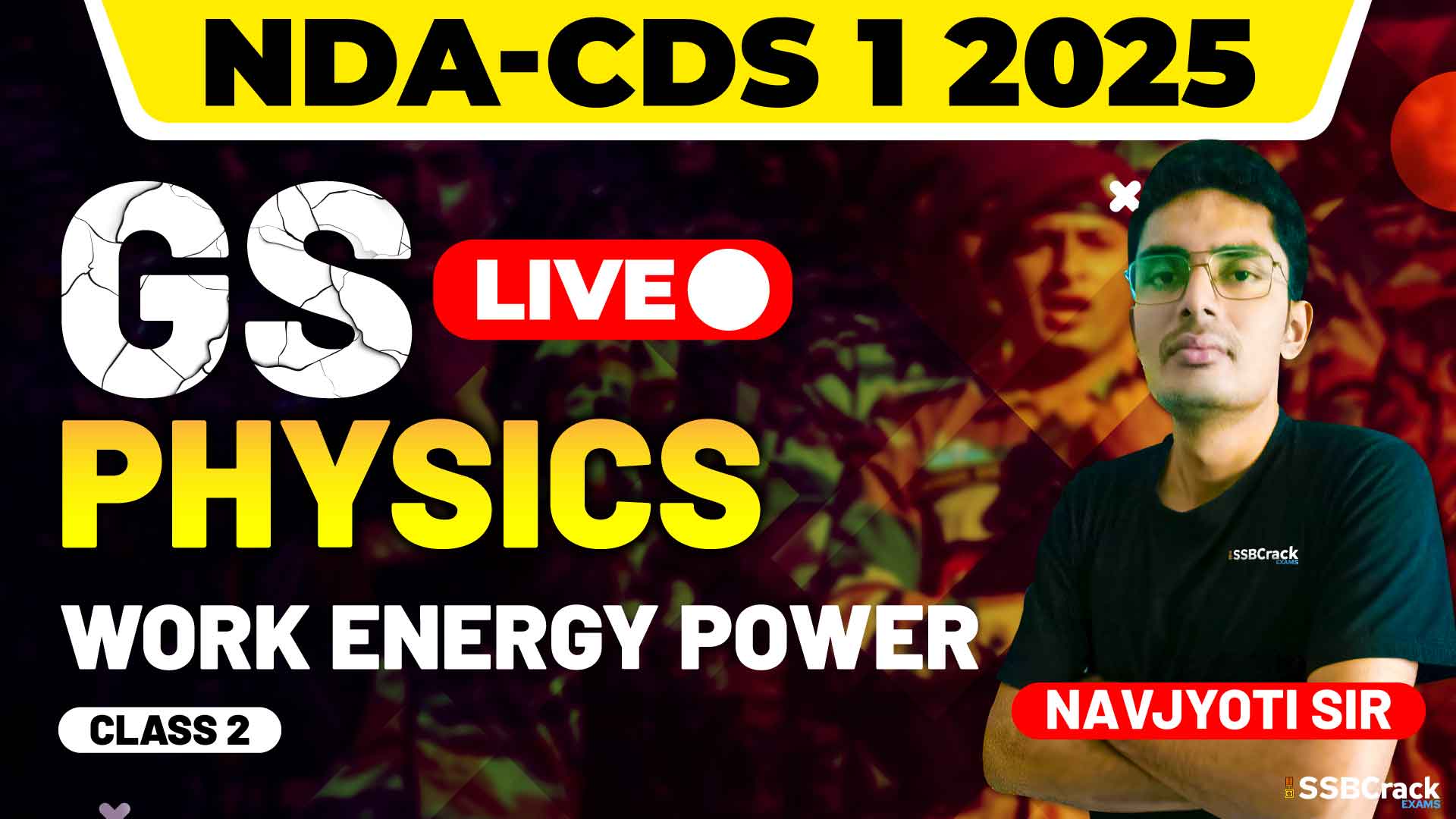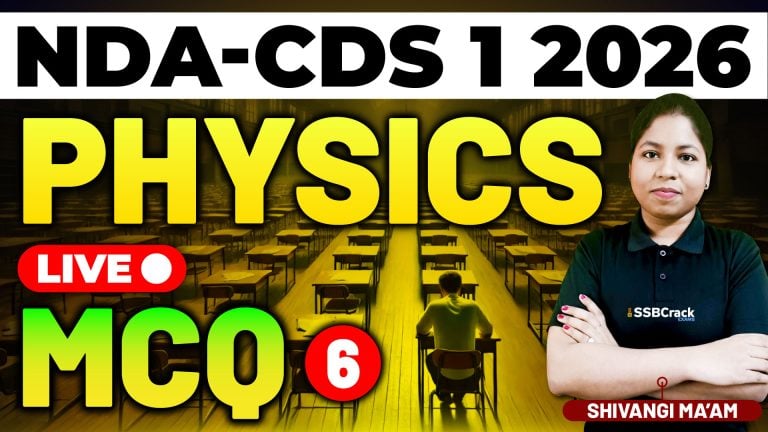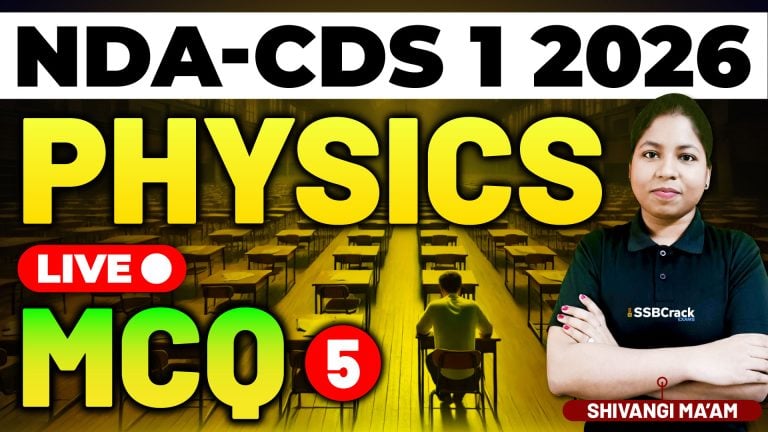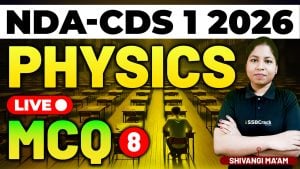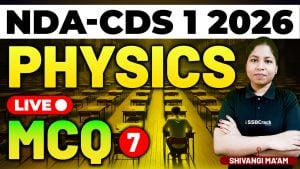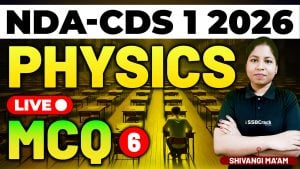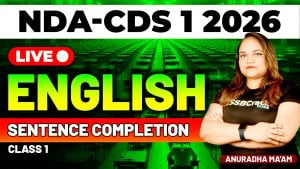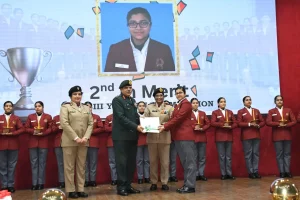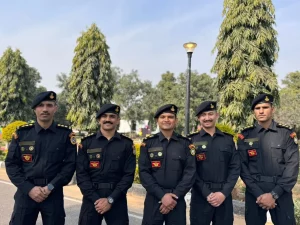In competitive exams like the National Defence Academy and Naval Academy (NDA-NA) Exam – Paper II (GAT) and the Combined Defence Services (CDS) GK Paper, the Physics section plays a crucial role in determining success. Among the core topics, Work, Energy, and Power holds great significance due to its conceptual clarity, practical applications, and scoring potential. To strengthen these concepts and enhance problem-solving skills, a dedicated class was conducted focusing on MCQ practice based on previous years’ questions and expected ones.
The class was designed to reinforce the subtopics discussed in earlier sessions, including:
- Concept of Work
- Energy: Kinetic and Potential
- Conservation of Energy
- Power
- Collisions: Elastic and Inelastic
The session focused on thorough practice to ensure students gain accuracy, speed, and confidence while solving questions related to Work, Energy, and Power.
Details of the Class
The class primarily revolved around multiple-choice questions (MCQs) to strengthen the understanding of key concepts through problem-solving. Here’s a quick look at the focus areas of the session:
1. Concept of Work
The session began with questions testing the basics of work – when work is said to be done and how it is related to force and displacement. Students practiced identifying situations where work is positive, negative, or zero. These conceptual questions helped clear doubts and cement the understanding of the topic.
2. Types of Energy
The MCQs tested students’ knowledge of:
- Kinetic Energy: Questions on moving objects and real-life applications.
- Potential Energy: Identifying energy stored in objects due to their position, such as water stored in dams or objects held at a height.
Special emphasis was placed on recognizing energy transformations, a commonly asked theme in competitive exams.
3. Conservation of Energy
A significant part of the class included questions on the law of conservation of energy, which states that energy is neither created nor destroyed. Students solved questions where energy transformed between kinetic and potential forms, such as in the motion of pendulums, roller coasters, and free-fall scenarios.
4. Power
MCQs based on power, the rate at which work is done, were practiced. Real-world applications like comparing the performance of machines, athletes, and vehicles were covered.
5. Collisions
Students solved questions differentiating between elastic and inelastic collisions. Key conceptual points such as momentum conservation and the behavior of objects after collision were discussed through targeted MCQs.
Overall, the practice session was well-structured, targeting exam-relevant areas to improve problem-solving skills and build confidence for the exams.
Essential Strategies to Prepare Work, Energy, and Power
To master this topic effectively, aspirants must follow a systematic and focused preparation plan. Below are essential strategies shared during the session:
1. Start with Conceptual Clarity
Before attempting MCQs, it is crucial to have a solid understanding of the basic concepts:
- Work: Focus on when work is done and its relationship with force and motion.
- Energy: Understand the difference between kinetic and potential energy and how energy transformations occur.
- Power: Grasp the idea of work done over time and its importance in real-life situations.
- Collisions: Learn to distinguish between elastic and inelastic collisions.
- Levers: Study the classification and real-life examples of first, second, and third-class levers.
2. Solve Previous Years’ Questions
Practicing previous years’ MCQs helps identify the pattern and commonly asked subtopics. Analyze questions carefully to understand what examiners frequently test and focus on those areas.
3. Focus on Real-Life Applications
Relating the concepts to real-world examples simplifies understanding and boosts retention. For example:
- Work: Lifting a bucket or pushing a car.
- Energy: Water stored in dams (potential energy) and flowing rivers (kinetic energy).
- Power: Comparing the efficiency of machines or electric bulbs.
- Levers: Using tools like pliers, crowbars, or scissors in daily life.
These practical examples make abstract concepts easier to comprehend.
4. Practice MCQs Regularly
Consistent practice of MCQs is essential for building speed and accuracy. Focus on:
- Solving a mix of theoretical and application-based questions.
- Practicing topic-wise MCQs to gain clarity on individual concepts.
- Timing yourself to improve speed and exam performance.
5. Visualize Concepts Using Diagrams
Draw simple diagrams while solving questions, especially for energy transformations, collisions, and levers. Visual aids can help simplify problems and enhance your problem-solving approach.
6. Attempt Mock Tests
Attempting full-length mock tests will:
- Simulate real exam conditions.
- Help you identify strengths and weaknesses.
- Improve time management skills.
Analyze your performance after each test and focus on improving weaker areas.
7. Clear Doubts Promptly
Never leave any concept unclear. Ask questions, refer to study materials, or discuss with peers to clarify doubts. A strong conceptual foundation is essential to tackle tricky MCQs.
8. Revise Thoroughly
Regular revision of key concepts, important points, and problem-solving techniques is necessary for long-term retention. Prepare concise notes for quick revision in the final days before the exam.
Conclusion
The recent class on Work, Energy, and Power provided aspirants with an opportunity to solidify their understanding of key concepts through extensive MCQ practice. By focusing on previous years’ questions and expected problems, the session ensured that students gained the confidence needed to tackle this important topic in the NDA-NA and CDS exams.
To succeed, aspirants must prioritize conceptual clarity, consistent practice, and strategic preparation. Solving MCQs, understanding real-life applications, and revising regularly will help aspirants master this topic and score well in the exams.
With dedication, focused preparation, and regular practice, success in competitive exams is achievable. Stay determined, keep practicing, and aim high. Best of luck for your preparation journey!
